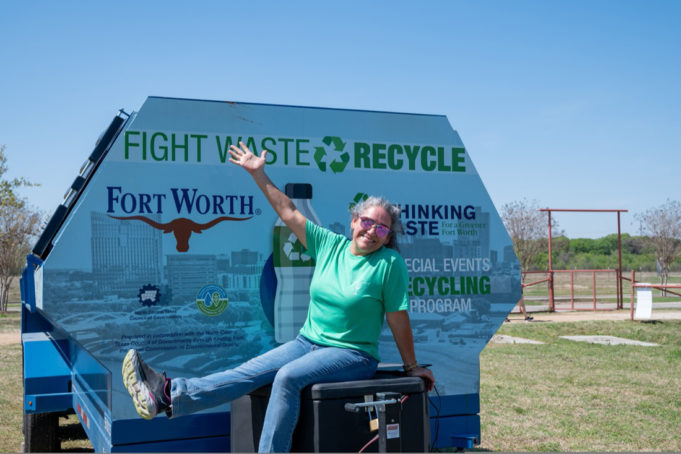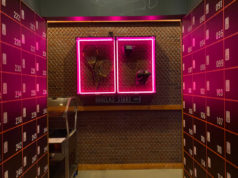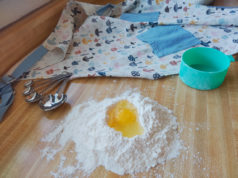Since 2014, the Fort Worth Food and Wine Festival has delighted foodies with a rotating series of events that feature the best food, beer, wine, and spirits Fort Worth has to offer. The festival promotes chefs, restaurants, and the local farming and ranching communities while the nonprofit FWFWF foundation raises funds for local culinary efforts –– from assisting budding chefs to helping locally owned restaurants stay afloat during the COVID pandemic.
But the fest also creates a small town’s worth of waste with events running over four days each year, and much of that detritus — aluminum cans, glass, plastic bottles, and cardboard –– is recyclable. Thanks to longtime volunteer Danelle Toups and her Eco team, the festival has kept more than 3,000 pounds and counting of material out of Fort Worth landfills.
When Toups isn’t wearing her green Eco shirt, she is the assistant director of library services at Tarrant County College’s Trinity River Campus. Toups has a long, loving relationship with the river — as an avid kayaker, she’s picked up trash along the banks and in the water near campus during her paddle time. Toups became a volunteer during the inaugural festival, and in 2019 she started a discussion with festival management after watching volunteers toss out thousands of bottles and cans.
“We need to be responsible about what we do with our waste,” she said. “Our landfills will be tapped out in a few years.”
Based on various reports, current landfills will be full as early as 2036 if we can’t find better ways to manage waste.
Festival organizers were willing to pilot a recycling program, especially one with volunteer support. The FWFWF runs on volunteers –– 206 of them kept the 2022 festival afloat — but the special program that Toups heads is specifically responsible for collecting and separating recyclable material from the thousands of pounds of trash generated from the chefs and festivalgoers. Toups readied a group of volunteers for the 2020 festival only to have the event shuttered by the pandemic.
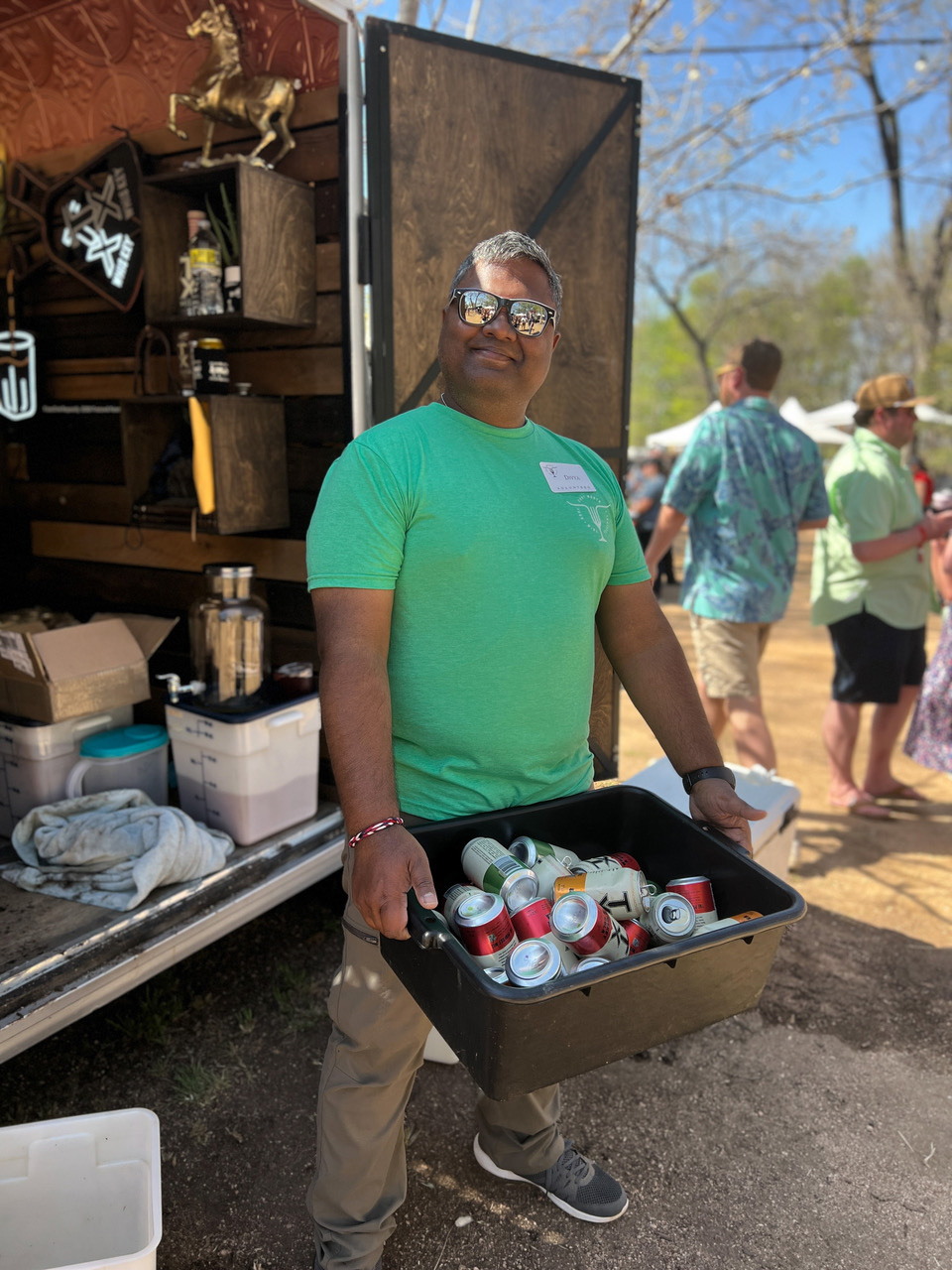
Courtesy FWFWF
“We geared up and everything got put on hold,” Toups said, “but it worked out because we beta-tested the recycling program in the fall of 2021.”
For the mini-festival in 2021, all events were held outside at the Heart of the Ranch in Clearfork. The gloriously shaded area is a perfect match for the brunch, barbecue, and burger events that happen there, but the huge footprint posed some logistical challenges at the beginning.
“The first year, we just had a handful of bins,” Toups said.
Watching the Eco team struggle with keeping bags in the tall wire containers and watching festivalgoers casually throw food waste in a designated recycle container forced her to rethink the approach.
“We tried to figure out the best process to gather recyclables,” Toups said. “We did not want to interfere with the joy of the festival. We wanted this to be seamless.”
Lessons learned from 2021 blossomed at the 2022 festival.
“The secret is that you have to have a trash can right next to a recycling container,” Toups said. “You have to reduce the friction for the consumer.”
Last year, Toups’s team circulated with bus tubs, clearing away waste in real time. Then the Eco team could streamline the process of separating the trash from the recycling.
“People want to recycle, but they don’t know how,” she said.
Because the majority of recyclable materials comes from vendors, Toups started each shift by introducing them to “the green shirt people” and telling them to pile the recyclables in a corner of the vendor booths, where, magically, the cans, glass, and cardboard would disappear.
“We have a giant City of Fort Worth 20-foot truck for recycling,” she said. “Last year, we filled and emptied that twice, along with another, smaller vehicle.”
The larger truck holds close to 3,000 pounds of recyclables. Toups said it’s not the just about the weight — the volume of the big cardboard boxes and the bottles take up extra space in landfills.
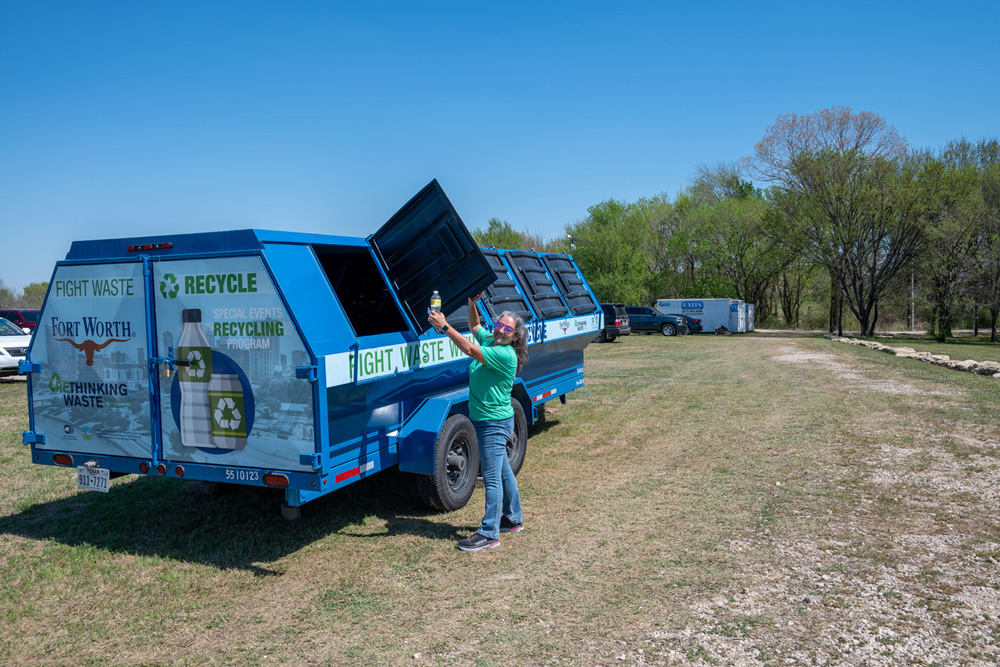
Courtesy FWFWF
Ironically, Toups had a previous job that informs how she attempts to make the FWFWF the happiest place on Earth in terms of recycling. As a former Disney World employee, Toups was accustomed to helping keep a giant theme park spotless while keeping a smile on her face.
“The guest is not inconvenienced in any way,” she said.
Toups feels most festivalgoers appreciate the Eco team’s efforts, especially at a giant festival. If you’re interested in joining the Eco team this year –– the FWFWF runs March 30-April 2 –– Volunteer Committee Chair Lee Henderson said it’s not too late to sign up. “We definitely want to make sure we can have the Eco team adequately staffed throughout the festival weekend.”
Perks of the gig include a festival pass to another FWFWF event and the chance to do some real good in Fort Worth. Contact Volunteer@FWFWF.com.
Toups hopes the Eco team fervor could be caught by sponsors of other events that occur year-round in the Fort.
“I would love to challenge all the major festivals in Fort Worth to attempt to recycle,” she said. “Start with the vendors. They’re a captive audience.”
Main Street Arts Festival already encourages fairgoers to bring their own water bottles to branded water stations to reduce waste.
“If we can create an environment where people expect recycling, and we make it easy, it could go a long way,” Toups said.



